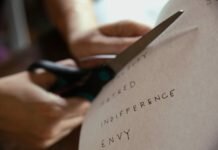The hard ridges of the leather-wrapped steering wheel are a sharp contrast to the tears pouring down my face, tears I try to hide by furiously wiping them away. My reflection in the rearview mirror is all smeared mascara and splotchy skin. I look like a toddler playing with a stash of Halloween makeup, and I ponder this for a moment thinking about what my costume would be if I really were about to attend a Halloween party. Would I call it ‘woman having an emotional break down’ or ‘abject failure of a mother’?
“You don’t have to go,” my husband says from the front seat next to me. His left hand reaches out and squeezes my shoulder sending warmth into my body. The lines on his face are smooth and streak-free except for a small furrow in the center of his forehead reflecting his concern for me.
“I want to go,” I tell him. “I just,” and here I suck in a ragged breath, “I can’t.”
We are sitting outside a Starbucks in Anaheim, California, but it’s not the coffeeshop I’m worried about.
“Eric.” My voice shakes when I speak. “I want to be there for them.” Quietly then, so the girls can’t hear from the backseat, I say under my breath, “A normal mom would be able to do this.”
This is really the crux of it. It doesn’t matter that I am medication compliant or that I follow all the suggestions my psychiatrist recommends for having bipolar disorder concurrent with PTSD. I am doing everything by the book but my book isn’t the same as everyone else’s. My book is the crazy-mom book, the mom who can’t manage something as simple as a family vacation to Universal Studios without having a panic attack. I re-grip the steering wheel waiting for a wave of fresh tears to pass and try to center myself. Willing my breathing to slow down, I finally pivot toward the backseat.
“Girls, I’m sorry,” my voice breaks before I can even complete the sentence. “I can’t go.”
They were six and four-years-old when I first received my diagnoses and I have spent the last two years since then doing everything I can to shelter them from the myriad challenges I face as my doctor and I work through medication after medication trying to find a combination that stabilizes me. My girls don‘t know that Lithium gave me diarrhea for six months. They don’t know that for the first year on meds I couldn’t get out of bed until almost 9 every morning, and even then I wasn’t fully mentally coherent until an hour later. During the early months of medication testing and trials, my husband woke the girls up, made their lunches, and took them to school before I could crawl my way out of a medication-induced sleep. We told them it was because ‘Daddy was in charge of mornings,’ but really it was because ‘Mommy couldn’t function.’
* * *
I text my bruja writer friend:
Are you at work yet or still home?
Work, why?
Was hoping you could pull some cards for me. Forgot my deck. Totally lost it this morning. Panic attack in front of the kids. I just couldn’t go with them. So now I’m sitting in the hotel by myself feeling like a failure.
A few minutes later she texts back:
I pulled ancient shaman on the deck on my phone. Old wounds require new types of healing. Bare feet on earth. Offer some water. Breathe it out. It’s ok. You’re not a failure. You listened to your body.
That’s wisdom. And that’s brave.
Her message reverberates in my brain.
You listened to your body.
That’s wisdom.
That’s brave.
I do not feel brave.
* * *
The first time I didn’t listen to my body was the night my dad touched me when he thought I was sleeping. I woke up to the sound of the toilet flushing and then a grown man sitting down on the bed. His fingers slowly unbuttoned my pajamas, pausing perhaps to see if I was still asleep or listening to hear if my mother was awake upstairs. I heard him swallow, his throat made a clicking sound when he swallowed up close. His finger was like a cold hot dog pushing and exploring my exposed breast. My body wanted to escape right then, but I didn’t listen to it. I didn’t know how to listen.
I experienced victim paralysis, the inability to move or respond to what was happening. My mind disassociated instead and I remembered what I had read in a spy book once, about how to make someone think you were asleep when you were awake. You had to mimic the breathing pattern of a sleeping person, inhaling and exhaling slowly, maintaining a steady rhythm. I focused on my breath and waited for the right moment to escape.
When he stopped I rolled to my side, taut with terror that he would try again. With my spy ears I listened to his breathing until I heard it become steady and shallow. I rose from the bed, keeping my eyes partially shut, and walked slowly, a spy would not break her role or tip the bad guy off in any way. Upstairs in the living room my younger brother was asleep on the floor. I grabbed granny’s quilt from the rocker and curled up alongside him.
* * *
The next morning my dad came upstairs in his military uniform and my revulsion felt like drinking rotten milk. I wanted to bolt out of the room, but if I did I would give myself away. When he said good morning his teeth and the whites of his eyes were yellow. I looked down as he stirred his Cream of Wheat; both the butter he added to it and the porridge itself was the same sickly yellow color as the pallor emanating from his face. I waited for someone else to notice but no one did. That’s when I realized there are two types of yellow in this world: there is bright, sunny yellow and there is true yellow. Bright, sunny yellow is the color the sun disperses across the land. People think it’s the color of truth, but that color is a lie. True yellow is jaundiced. It is weak and ugly and once you know how the world really works, you can never see the bright, happy yellow again. Everything that is tainted with lies takes on a pallid hue.
* * *
The seats in our old Suburban always creak as we drive down gravel roads. I reach out and pick at a peeling piece of faded brown pleather on the back of the driver’s seat. Ahead of me, my mom chatters about the church talent show.
I stare at her neck. She has ivory skin and dark black hair with a streak of silver that starts at the crown of her forehead and arches back like Cruella de Ville. Where Cruella is lanky and angular, my mother is short, soft, and round. She has moles and skin tags scattered across her body. I focus on one peeking out from her collar line. We are about to turn onto the main road. My stomach is tight. I will myself to tell her. I try to shape words to force my lips into moving, but I don’t know what to say or how to start. Eventually I focus on the word ‘mom.’ If I can just say that one word, blurt it out, maybe I can say the rest. If I say, “Mom, Dad touched me,” what will happen next?
A series of cascading events rumbles through my head and the faster they move the harder I seal my lips shut. If I tell her what has happened, will she leave my dad? If she leaves my dad, all my brothers and sisters will be torn apart and there are five of us still living at home. My mother can barely take care of herself. She would never be able to raise us on her own. The term ‘in the poor house’ runs through my mind, and I think about what I will be doing to my siblings if I say something.
We pull into the parking lot at church. I run into a bathroom stall and throw up my dinner. When I come out my mom asks, “Are you going to do anything for the talent show?”
I tell her I’ll do a song and a dance.
* * *
In order to not say anything, I cast myself in the role of daughter acting like everything is fine. I assign every one roles, so my father is not my father but rather an actor playing him and we are all in on the charade. I engage with people in flat, two-dimensional conversations, we’ve all become characters in a Doonesbury cartoon.
I avoid sitting next to my father and will myself to stay awake and vigilant at night in case he tries to touch me again. My thoughts loop in torturous cycles wondering what else he may have done when I was sleeping. I scratch at my wrists leaving long nail marks up my arm and grab fistfuls of my stomach skin until my fingernails leave angry welts across my abdomen.
I stop eating. In the mornings I pack my lunch along with the rest of my siblings and then give away my food at school. Dinners became the pinnacle of my performance. I serve myself a half portion of everything offered and then eat only half of each thing on my plate. I focus on taking slow bites and chewing each one 20 times. I push the food around to make it look like I have thoroughly partaken. At 5’3” I get down to 88 pounds. Each time I step on the scale I revel in the decreasing numbers and the mastery I have over this one part of my life.
* * *
I begin to see the full spectrum of the color yellow again when the actor playing my mother comes into my room, sits on my bed, and asks if my dad has ever touched me. I blink my eyes and they feel grainy. I consider denying that he has ever touched me, but my body is exhausted. I begin to nod, slowly. My voice won’t work but my head keeps nodding up and down and then, weak and underfed, I collapse into deep, wracking sobs.
The relief I feel at finally being able to tell what happened is countered with the terrifying reality of what lies ahead. I feel certain that any mother, when told what her husband has done to her child, would leave that man. I am crying at the path I have set my family on by telling the truth, one of certain financial and emotional instability. How will my mother take care of us on her own? She has a hand on my shoulder and rocks her own body back and forth, her silent tears in contrast to my loud, gasping cries. I use my sleeve to wipe my face and that’s when I notice the flowers on her dress. It is the faded blue one she wears all the time, a “muumuu” she calls it. It has metals snaps up the front and for the first time in years, I see the blossoms that splatter across the expanse of her body as the bright sunny yellow that they truly are—not the jaundiced yellow that I have grown accustomed to seeing. Then I understand: one can only see the full vibrancy of the color yellow when you tell the truth. I sit up, focus on those flowers, and tell her everything.
* * *
This is the part of the story where the reader relaxes a little. When they think, ‘a-ha, now everything will start to become right again for this child.’ They will assume things got hard, but that my mother stepped up to the task and raised me and my four younger siblings on her own and I got better and thrived, and here I am telling you this story today, a scrappy survivor and one that now walks easily in the world. But you have to remember the very beginning of the story, where I opened as a 39-year-old woman having a panic attack in a parking lot in front of her husband and two young daughters.
Two things happened after I told my mother what my father had done. The first was that after he admitted it, after she didn’t press charges, after he was asked to retire early from the Air Force, after we were told that my father was ‘now okay to return home,’ my mother decided to stay with him. Her favorite flower is a yellow rose and she often talks about how the roses where she lives aren’t the same color as the yellow roses from Texas, where she grew up. Now I know that it’s not because roses in Alaska don’t have the same luster—she just hasn’t seen real colors in a long, long time.
The second thing that happened, after years of not listening to my body, was that I became unable to hold in lies. After all that time of stuffing myself into the smallest human container I could create, the world handed me this offering in exchange for the truth: I can now see the visible spectrum of yellow in vivid hyper-color and, in exchange, I no longer have the ability to fold in on myself. My poker face is gone, and if I push my body to do things it doesn’t want to do, it rebels. Panic attacks and anxiety are the most visible outward symptoms of this rebellion. The ups and downs of my bipolar disorder are the in-betweens.
You listened to your body.
That’s wisdom.
That’s brave.
Is it bravery if I’m incapable of not listening to my body?
* * *
My husband and daughters return from Harry Potter World bringing gifts from Honeydukes sweet shop. Their tiny hands hold up bright packages of Chocolate Frogs and Bertie Bott’s Every Flavor Beans.
“We missed you, Mom,” my oldest says. Both the girls are in bed now and finally calming down after a full day of vacation-land adventure.
“I missed you too. You know how I always tell you that it’s okay to have big feelings? Today I was the one having big feelings. It happens to grown-ups too.”
“Do you feel better now?” the little one asks.
“I do, thank you for letting me listen to my body.”
Their eyes are heavy, I kiss their cheeks and wish them goodnight, gently taking a copy of Harriet the Spy out of my older daughter’s hands.
Old wounds require new types of healing.
It’s ok.
You’re not a failure.
I wait on the edge of their beds until I hear their breathing slow into the steady pattern of children sleeping. I slip out of their room and, as the door closes, a ray of light beams onto my youngest daughter’s head. Her hair is the color of long summer days of spun gold and fresh picked dandelions. It is a color I would have never been able to see without telling the truth.
Photo by Lubomirkin














You are so brave! Thank you for being so honest and sharing your story, you are a beacon of truth and hope in these dark times. Thank you!
Thank you for sharing your story. Your honesty and bravery touched my heart deeply as I feel for all survivors of sexual abuse or any kind of abuse for that matter. I admire your courage and strength in dealing with everything that goes with someone who has bipolar and PTSD. Your voice resonates with everybody and inspire to have faith and hope that with a family like yours who love you unconditionally and will always be there for you, will help you heal soon. Sending you warm hugs and healing prayers!🙏🙏🙏
Comments are closed.